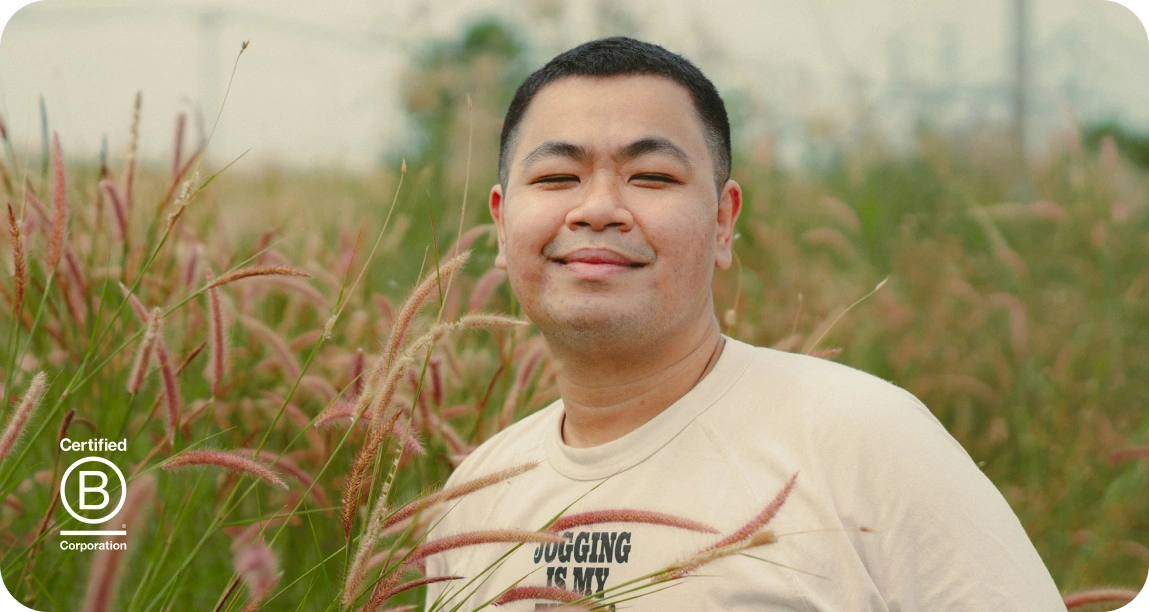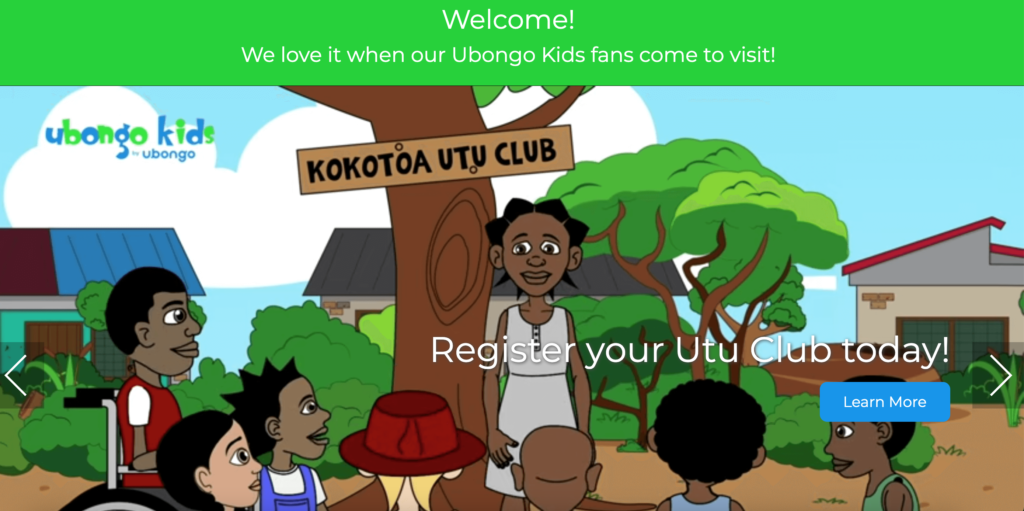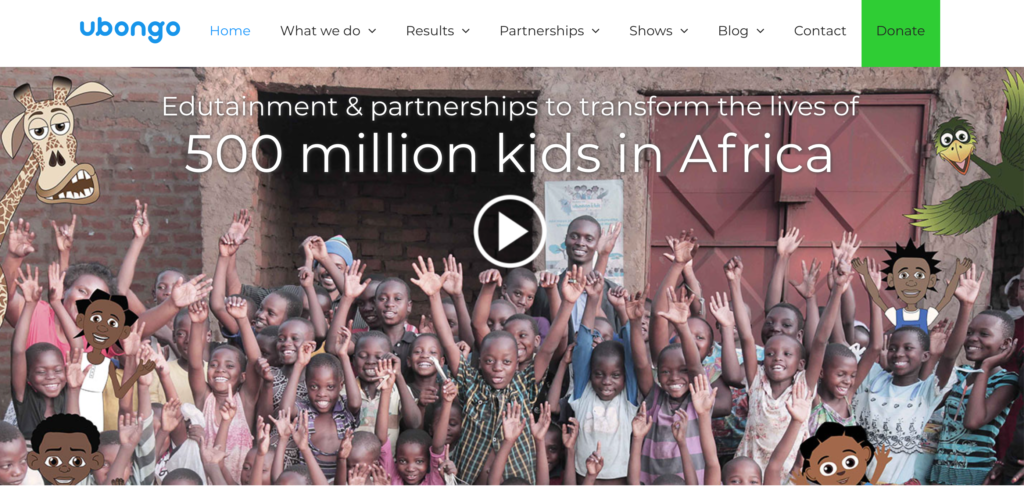A free training program for training CS reps with the skills, tools, and knowledge to delight customers and resolve issues.
Ubongo is an NGO, with a clear mission: "to use top quality, localized edutainment to help Africa's 440 million kids learn, and leverage their learning to change their lives".
Ahead of World Children's Day, we wanted to share this important project, that significantly improves school readiness and learning outcomes for kids, and also promotes social and behavioral change for kids, caregivers, and educators.
We have interviewedChristina Bwana, COO at Ubongo, who oversees production and operations throughout the different entities at Ubungo.
https://youtu.be/7df9QR3d6fU
Christina, tell us more about Ubongo
We are an NGO, and we have an entity in the US, Tanzania, and South Africa. We also have on the ground Ubongo, as we call ourselves in different countries in Africa because we really position ourselves as a Pan-African organization.
In the content we create, we're trying to include as many different cultures as possible. We adapt into different languages across Africa. When we're creating the content, we're doing user testing with different groups of children across different countries in Africa.
The content we are making for the African kids really comes from the African kids themselves.
How did you build your team at Ubongo?
It started with a group of co-founders who just all came from different fields: a social entrepreneur, an IT guy, an art teacher, a maths teacher, and animators. All of them with a shared passion: how do you improve their education in Tanzania? They all met at different times. They all knew each other at different times, and then one introduced one to each other.
Then when they all came together, they realized: this is really what we want to do. They really wanted to change the way education is done in Tanzania: to make learning fun, because, from their different experiences, they saw that learning is sitting in the classroom, trying to memorize what the teacher writes on the blackboard.
But how do you make learning fun through fun visuals, through fun music? How do you encourage the new generation, the younger generation to find the fun in learning?
Also looking at the educational challenge across Africa, the challenge is that the social and cognitive development of children is really low across Africa. And this really starts from the youngest age.
Children, even ages between three and four, experience really low cognitive social-emotional development. This is compounded as they grow older, together with the fact that in primary school there are not enough teachers, there are not enough resources. A lot of students don't even have a single textbook to call their own.
So this gets worse and worse progressively. We were looking at:
- How do we solve the crisis from a young age?
- How do we start building those building blocks of educational building blocks from a young age and making sure that even from a young age, children have the capacity to think for themselves, to really understand learning, to find the learning fun?
- And then as they go into primary and secondary school how to be able to use the resources within themselves, even if they don't have textbooks?
- What other resources can they use to be able to continue learning? Or to be able to use the learning that they get to really change the trajectory of their own life and that they're not just passive receivers of what life throws at them?
A Smarter Way to Build Your Global Team
What is is Ubongo trying to solve?
With Ubongo we're trying to solve the educational crisis across Africa, specifically, the quality of education. So we're not looking at it from the angle of how many schools to build.
We're looking at it from the angle of the opportunities or the environment that kids are in. How do we get them the best quality education? Also for the last mile children, those who have no access to technology, no access to Internet or electricity.
How do we get our content to them through principles on border to border? Like with motorbikes going across different villages?
They're already behind in terms of social and cognitive development. How do we start at that young age in building that foundation for them and then, as they get older, adding in topics from the curriculum, adding in curiosity elements, that will also help them to be able to take control of their learning and control of their lives a little bit more.
They're not just passive receivers, but they're children who can say:
"I am a curious child. I will use this curiosity to find out more about ABC. And then this is how I changed the trajectory of my life".
What were Ubongo's main challenges?
Right now the biggest challenge we are facing is accessibility, for the last mile children. We've come up with different ideas. We have our two kids platform that we open up to everyone who can download.
Whether you're a teacher, parent, or community leader, you can download our content, print it out, take it to your community. We're also working with motorbike drivers to be able to either show on a TV screen or printables take our content to different communities.
Historically, our challenges have been the setup in Africa of mass media. A lot of TV stations are set up to get profit and not necessarily to use the content for free. Instead, we want to give our content for free so that you can reach as many kids in Africa as possible.
Early on there was a mindset of "we won't show the content unless we get profit out of it".
We know that within the system we're working with, there's also a financial aspect, and then even for us, it's sustainability. We're donor-funded.
But how do we get to that point where we're sustainable from our content, from our merchandise, so that we can continue doing more for kids across Africa, without being kind of restricted because of funding?
With the current crisis, with a lot of kids being at home, broadcasters and governments have actually reached out to us wanting our content even more easily without having to go through all the bureaucracy and all of the other kinds of obstacles that we would originally face.
I think that has also helped the mindset shift.
What are the main learnings from Ubongo?
The advice we would give to ourselves is to look at different revenue options.
When we started, we realized we have this great content that we know will work for the kids. But we need someone to fund it. We really spend a lot of time looking at financial sponsors, like banks or telecommunications companies.
We got one. And that was great. They sponsored our first season. But then we spent a long time after that, looking for those kinds of funding.
A lot of time was put into that until we kind of shifted the mindset. We are nonprofit, so we don't have to. That doesn't have to be our main source of funding. Let's look for other sources of funding, so let's align our vision and mission, our revenue stream, and understand if this is the path we want to go down on.
Who are the people who can walk with us longest on that path versus people who can work with us only in the short term and also know the environment? There's only a limited profit you can make in Africa from the merchandise.
Although right now a lot of our merchandise is being bought from the diaspora family, in the US, and in Europe. We spent a long time investing in revenue streams that were not in line with our vision and mission.
What qualities do you look for when you're hiring new team members?
Actually, we've kind of evolved in this because we used to hire for skills and someone who we know they can get the job done without a lot of handholding.
We're growing very fast now. We're hiring people who have the same values as what we say. Our company stands for culture, of how you work together, the collaborative spirit, "doing it for the kids". So we look at people's values and people's culture because we understand now that skills you can train as you go along and even internally at Ubongo, we do a lot of capacity building.
That's one of the things we hold very dear. But it's hard to change people's values and change people's cultures. Right now, we hire from the angle of how will they work collaboratively with the team?
How will they prioritize kids across Africa versus my kind of own personal growth or what I need? I think it has to be a balance between having the skills and the professional skills but also having the values.
Sometimes we find ourselves working in the office until nine at night, we don't work every day until nine at night. But you want someone who will understand why we have to do that.
Some final recommendations for our readers?
The organization is called Ubongo. If you want to go online, ubungo.org it's a good starting place. From there, you can find links to other different platforms. You can check YouTube, you can either type in Ubongo Kids or Akini and Me, our two main shows.
And then from there, there's always kind of recommendations to the other channels from that. Those are the two key places that you can find us.
Obviously, start with the website and then from there, whatever kind of product you want, then you'll find links of going to the app store or whatever other platform that our products are on.
I always say we're building brains in order to build change, so we're not looking at it from we have to necessarily tackle change as an external person, but we're looking at it like, how do we help impact change as an internal person?
So how do we build the kids to trust themselves, to have confidence? How do we build their cognitive abilities to then be able to take change into their own hands? What we've learned and my advice would be really to build someone to do the rest. You can't walk with them from the full path, so just the capacity to build someone to be able to walk the rest of the path.
Work for Impact supports brands and organizations for a better world
If you want to learn more stories from startups in the impact space, check the series:Work for Impact Meets.
We believe in setting goals that benefit everyone, not just ourselves. By working with socially and environmentally responsible organizations and nonprofits, we want to promoteprojects that have a positive impacton the world as a whole. At Work for Impact, a job is not just a job. It is the beginning of a larger journey that will unlock future potential and provide meaningful opportunities worldwide. Sign up for free and start discovering new ways to make an impact.





